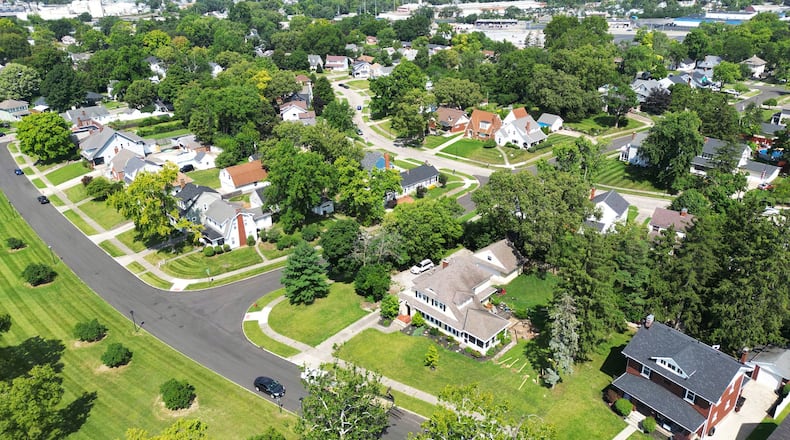McNamara said his office has fielded 8,686 phone calls from concerned taxpayers and he has spoken to many who have visited his office. Barring a hoped-for legislative fix to mitigate the looming median 37% property value hike, McNamara said taxpayers are worried as much about the future as the bills they just paid.
“It feels like the tenor is a bit more distressed,” McNamara said. “That concerns me because next year is when the big increase is going to be felt.”
He said his office billed a total of $627.5 million and $27.9 million is delinquent. There is a 10% late payment penalty that escalates the longer taxes go unpaid but the treasurer offers payment plans.
Bills are higher in part because two countywide tax breaks expired and former auditor Roger Reynolds lost his appeal of the 2020 property valuation hike. Those factors combined account for about $28.2 million of the $41 million increase.
Another big factor is voters approved new levies last year that all told added $390 per $100,000 to the tax rolls in Fairfield, Middletown, Seven Mile and Madison and Reily townships. Butler County Auditor Nancy Nix has said 80 new levies have been approved since 2008.
Here is the dollar impact per $100,000 in those communities:
- Fairfield fire levy replacement and increase: $139.74
- Middletown fire bond issue: $35
- Madison Twp. additional fire levy: $105
- Reily Twp. fire levy replacement: $92
- Seven Mile expenses: $18.81
The majority of taxpayers in those communities chose to raise their own taxes, but outside influences have conspired to hike the bills elsewhere. After a two-year battle with the state tax commissioner over an average 20% value hike for the 2020 reassessment, tax bills for 2020 and 2021 had to be recalculated for residential and agricultural properties. Reynolds made challenges for Fairfield, Hamilton, Fairfield Twp. and West Chester Twp., and the adjustments were on the first half tax bills.
Reynolds kept the increases at his levels — on average 14.5% — rather than what the state demanded so corrected bills needed to be calculated. The total amount added to the bills was $6.1 million.
In addition to the recalculated bills for the prior years, all taxpayers saw an increase because two countywide tax breaks were erased. The combined impact was roughly $84 per $100,000 in home value.
With the uncertain post-COVID economy, the commissioners declined to extend their $18.5 million property tax holiday and the Butler County Board of Developmental Disabilities also canceled their $3.6 million tax break.
The commissioners decided not to extend the tax break when they passed the $116 million general fund budget this year, that is structurally balanced but with a slim $2 million margin between revenues and expenses.
Commissioner Don Dixon said the rollback was a good move to make at the time, to give taxpayers some of their own money back to help get them through the pandemic, but things have changed: “if ‘23 ends up being as crazy as ‘22 we’re going to be really close making revenue and expenditures,” he said.
“It’s been a crazy economic time, unprecedented, uncharted, this is exactly why we keep the budget as tight as we’ve kept it, we’ve carried over the surplus, we’ve kept our expenditures down,” Dixon said. “I know we spent $18 million on a first time ever real estate program we implemented last year, that was a good thing, the economy needed it and I think if you’re going to do it that was was the time to do it.”
With cash reserves at 149% of its annual budget, the DD board decided to give the tax cut in 2020 and extended it last year, after receiving a federal pandemic cash infusion and decreased service expenditures because of COVID-19. Superintendent Lisa Guliano told the Journal-News at budget time a number of things factored into the decision to end the tax break.
“We really did see our cash reserves come down through the process of giving back to the taxpayers over the last two years,” Guliano said. “We were at a point with our expenses returning to normal and also just the fact the pandemic relief dollars, those are ceasing, all of that came together where our cash reserves are projected to be more normal moving forward and we actually are spending more and starting to utilize more of those reserves.”
This year was a perfect storm of events that conspired to sting taxpayers, but next year officials are predicting a tax disaster for many taxpayers who can’t afford it. Early on the state tax commissioner recommended a 42% average property value hike for residential and 110% for agricultural properties. Now those numbers are down to 37% and 109% respectively.
“Those things came off and so people are feeling that this year,” McNamara said. “But I think they’ll see an even bigger bump next year when the new valuations are effective. I know my house value is supposed to go up far above the average for the county. I think I’m going to be around 52%.”
Dixon issued a “call to action” to statehouse and local leaders when early value hike predictions started coming out. Since then Sen. George Lang and Rep. Thomas Hall have been and are still working on a couple “band-aid” pieces of legislation to give taxpayers a break while they work on longer term solutions.
Meanwhile Nix has proposed a one-year solution — having taxing bodies forego the cash windfall the value hikes will produce — to give the state time to pass legislation. She said her offices is still finishing their work finalizing all of the numbers and then she and Real Estate Director Mike Stein will begin meeting with the various taxing bodies.
About the Author

